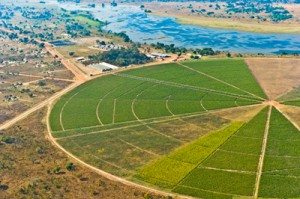ZamPalm could save millions in cooking oil imports
September 22nd, 2014
New project targets edible oil self-sufficiency within ten years
LUSAKA, ZAMBIA – Zambia has the potential to be self-sufficient in cooking oil in the next ten years, thanks to a multi-million dollar palm oil plantation investment by Zambeef Products plc.
The massive ZamPalm development in Mpika District is expected to remove the need for the nation to import cooking oil from other countries, which could save more than US$50 million a year in costly foreign exchange expenditure.
“Zambeef is confident that its new ZamPalm project will transform the outlook for Zambia’s edible oils industry and have a significant impact in helping to reduce the drain on the country’s balance of payments caused by the current import of oil from abroad,” said Zambeef Chief Executive Officer Francis Grogan.
ZamPalm is due to start production at the end of this year, producing an initial 1,400 tonnes of crude palm oil in the first season, increasing to 50,000 tonnes by 2020. That output is based on the current cultivated plantation size of 326,000 palms planted on 2,132 hectares, which is expected to increase dramatically as the company develops the full 20,100 hectares of the plantation in coming years.
Some 108,000 palm seedlings are currently in the main and pre-nurseries and the intention is to plant another 700 hectares in 2015, taking the total plantation to 2,832 hectares, and construct a crushing mill.
The first mill will be established in 2014/15, with an additional mill to be added in 2017.
Zambeef has spent US$16 million (more than K100 million) on the ZamPalm project to date, and expects the division to turn a profit in 2020.
In addition to ensuring that Zambia is self-sufficient in cooking oil, and thus saves foreign exchange, the ZamPalm project will also benefit the country by providing employment and associated development in the remote Chinama chiefdom of Chief Kopa of the Bisa people in Muchinga Province.
The project currently employs 120 permanent staff and up to 400 casuals in the planting season, with up to 2,000 new jobs predicted as harvesting begins in the coming season.
Zambeef has conducted considerable research into the agricultural side of the ZamPalm project as well as its business case and environmental impact.
Challenges include the remoteness of the plantation, and its associated inaccessibility, lack of amenities such as electricity, and the large investment required before productivity comes on stream.
Zambeef set up the ZamPalm project in 2009 to complement its Zamanita edible oils operations, knowing that Zambia consumes around 90,000 tons of cooking oil per year and only produces around 25,000 tons from soyabeans, with the shortfall having to be imported.
The import of 70,000 tonnes of crude palm oil costs the country approximately US$56 million (around K380 million) a year.
About Zambeef Products Plc
Zambeef Products Plc is the largest integrated agribusinesses in Zambia.
The group is principally involved in the production, processing, distribution and retailing of beef, chicken, pork, milk, dairy products, eggs, edible oils, stock feed and flour. The group also has large row cropping operations (principally maize, soya beans and wheat), with approximately 8,350 hectares of row crops under irrigation and 17,000 hectares of rain-fed/dry-land crops available for planting each year. The group is also in the process of rolling out its West Africa expansion in Nigeria and Ghana, as well as developing a palm project in Zambia.
It slaughters more than 80,000 beef cattle and 6 million chickens, and processes 8 million litres of milk per year. The company has 122 retail outlets throughout the country, along with three wholesale depots.
More information is available at www.zambeefplc.com

